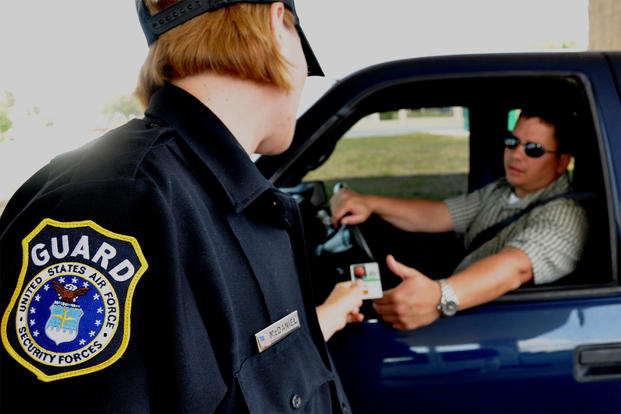Driver's licenses and most other IDs issued by eight additional states will no longer be accepted as official identification for accessing U.S. military bases -- starting July 10 -- unless new extensions are granted by the Department of Homeland Security (DHS), Pentagon officials said this week.
All non-enhanced, state-issued IDs from Oregon, Alaska, Oklahoma, Kentucky, South Carolina, Virginia, Pennsylvania and Washington will join IDs from Montana, Minnesota, Missouri and Maine on the list of those that do not comply with federal identification standards and cannot be used to enter federal facilities, according to DHS.
At issue is a 2005 law known as the Real ID Act, which requires states to meet minimum security requirements for state-issued ID cards such as driver's licenses, according to DHS. Although the agency’s extension for the eight states expires June 6, Pentagon officials have granted extra time for DoD-operated locations.
"After a short grace period, we will begin enforcing the Real ID Act's prohibition on July 10th, 2017," said Navy Cmdr. Linda K. Rojas, a DoD spokesperson.
Related links:
- More State IDs No Longer Accepted at Bases
- Air Force Bases Will No Longer Accept Some IDs
- Pentagon to Issue Guidance to Bases 'Soon' for Blocked State IDs
Lawmakers in South Carolina, Alaska, Washington, Oklahoma, Pennsylvania, Virginia, Montana, Minnesota and Maine have passed legislation to bring their state IDs into compliance, according to news reports. However, simply passing a law does not automatically ensure an extension, a DHS official said. As of June 2, those states had not been granted extra time, Rojas said.
"Extensions are granted following a formal DHS review process after a state makes a request," said Justine Whelan, a DHS spokesperson. "The basic concept of an extension is that steps are being taken, or have already been taken, to come into compliance. But a state needs time or other resources to fully implement."
Whelan declined to speculate whether the eight states would receive extensions before the June 6 or July 10 deadlines. Base visitors looking for up-to-date information on compliant IDs and extensions can visit the DHS interactive map, she said.
While Homeland Security officials have issued a list of other acceptable forms of identification, including U.S. passports and Native American tribal ID cards, installation commanders are free to develop their own lists of supplemental forms of ID.
Those lists vary by base. For example, some bases, such as Fort Leavenworth, Kans., accept non-compliant IDs if they are accompanied by voter registration cards, while Joint Base Lewis-McChord, Wash., does not. Visitors with IDs from non-compliant states should contact the base they wish to access for more information.
-- Amy Bushatz can be reached at amy.bushatz@military.com.
Related Video:
Hunting Down Homeland Security




























